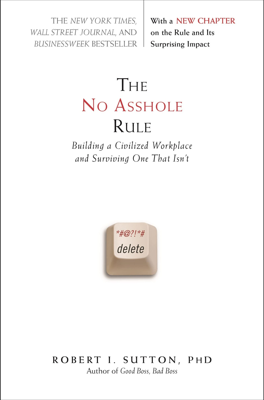How to Implement the Rule, Enforce It, and Keep It Alive
Tolerance and Enforcement of the Rule
Organizations vary widely in their enforcement of the no-asshole rule, often accommodating certified assholes until their behavior becomes too costly. High tolerance exists for arrogant and destructive behavior, especially if the individual is seen as highly talented or difficult to replace. However, when the damage becomes too extensive, such individuals are ultimately punished or removed.
Notable Examples
- Bob Knight: Legendary basketball coach fired for consistently hostile behavior.
- Terrell Owens: Philadelphia Eagle suspended for relentless arrogance and detrimental conduct.
Effective Organizations
Some organizations explicitly enforce the no-asshole rule to maintain a positive culture:
- Google: Uses its "Don't be evil" motto to filter out and penalize toxic behavior during performance evaluations.
- Southwest and JetBlue Airlines: Emphasize hiring and firing based on attitude and cultural fit, rejecting candidates who exhibit rudeness or arrogance.
- Universal Enforcements: Organizations that achieve success in this area integrate behavioral expectations tightly with their hiring and firing practices.
Making the Rule Public
Organizations must not only implement respectful policies but also ensure these policies are visibly enforced to avoid hypocrisy. Hollow statements about behavior without corresponding action can lead to cynicism and mistrust.
Policies and Practices
Successful organizations integrate the no-asshole rule into their core policies and practices, which might include:
- Hiring Practices: Screening candidates rigorously to avoid hiring individuals with demeaning behavior.
- Disciplinary Actions: Promptly removing employees who consistently mistreat colleagues.
- Clear Communication: Publicly communicating the expectations and repercussions related to the rule.
Cultural Reinforcement
Attention to small gestures and everyday interactions can significantly impact organizational morale and adherence to the rule. Consistent behavior from leadership, such as respectful treatment in daily interactions, reinforces organizational values.
Addressing Power Dynamics
Higher levels of power can lead to increased likelihood of individuals acting like assholes. Effective strategies include:
- Reducing Power Distance: Encourage practices that minimize unnecessary status differences.
- Monitoring Power Holders: Ensure that powerful individuals don’t exploit their positions to demean others.
Constructive Confrontation
Organizations must also teach employees how to engage in productive conflict:
- Focusing on Ideas: Encourage debates over ideas, not personal attacks.
- Behavioral Training: Provide training on positive confrontation and evidence-based discussions.
Handling Customers and Clients
Extending the rule to interactions with customers and clients keeps the environment consistently respectful. This approach ensures that employees do not endure external abuse and that overall organizational culture remains positive.
Key Strategies to Enforce the Rule
- Say It, Write It, Act On It: Make clear commitments and follow through with actions.
- Hire with Caution: Avoid allowing existing assholes to influence the hiring process.
- Immediate Action: Remove toxic individuals swiftly to prevent further damage.
- Treat as Incompetent: Frame persistent mistreatment as professional incompetence.
- Mitigate Power Effects: Be aware of how power can corrupt and take steps to counteract it.
- Regular Interventions: Focus on daily interactions and make small but frequent adjustments.
Conclusion
Enforcing the no-asshole rule is about creating a consistent and respectful environment through both formal policies and daily actions. Organizations that marry big-picture philosophies with attention to minor interactions create the most effective, humane, and productive workplaces.
